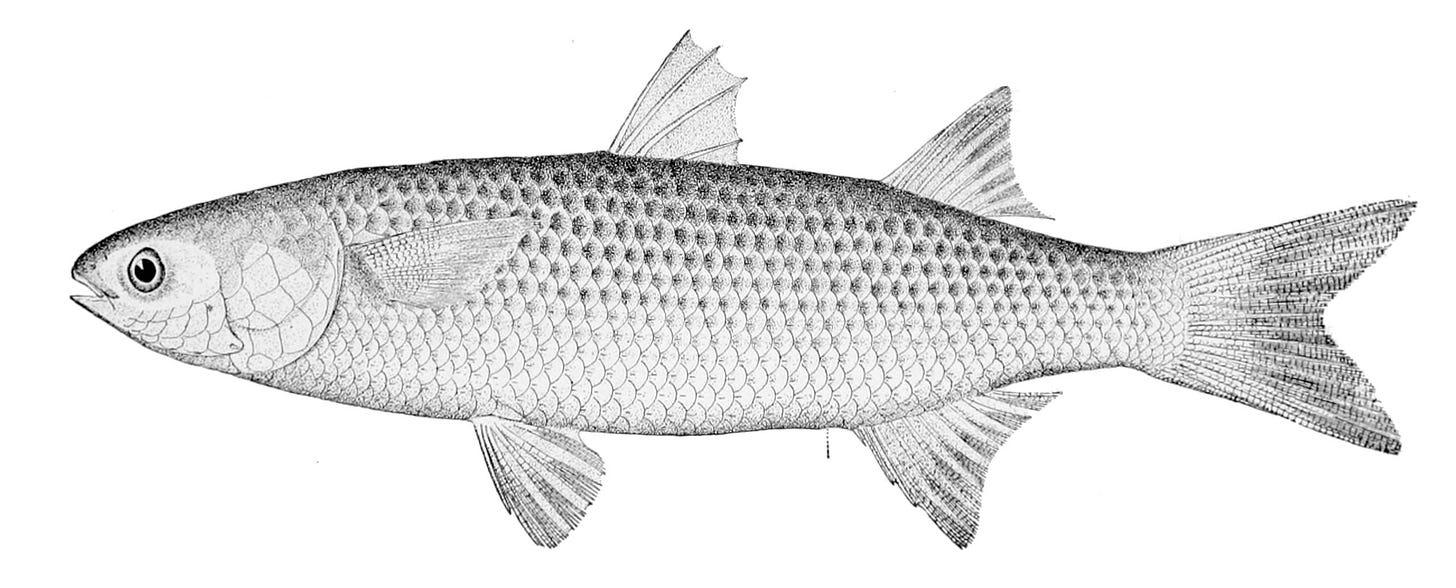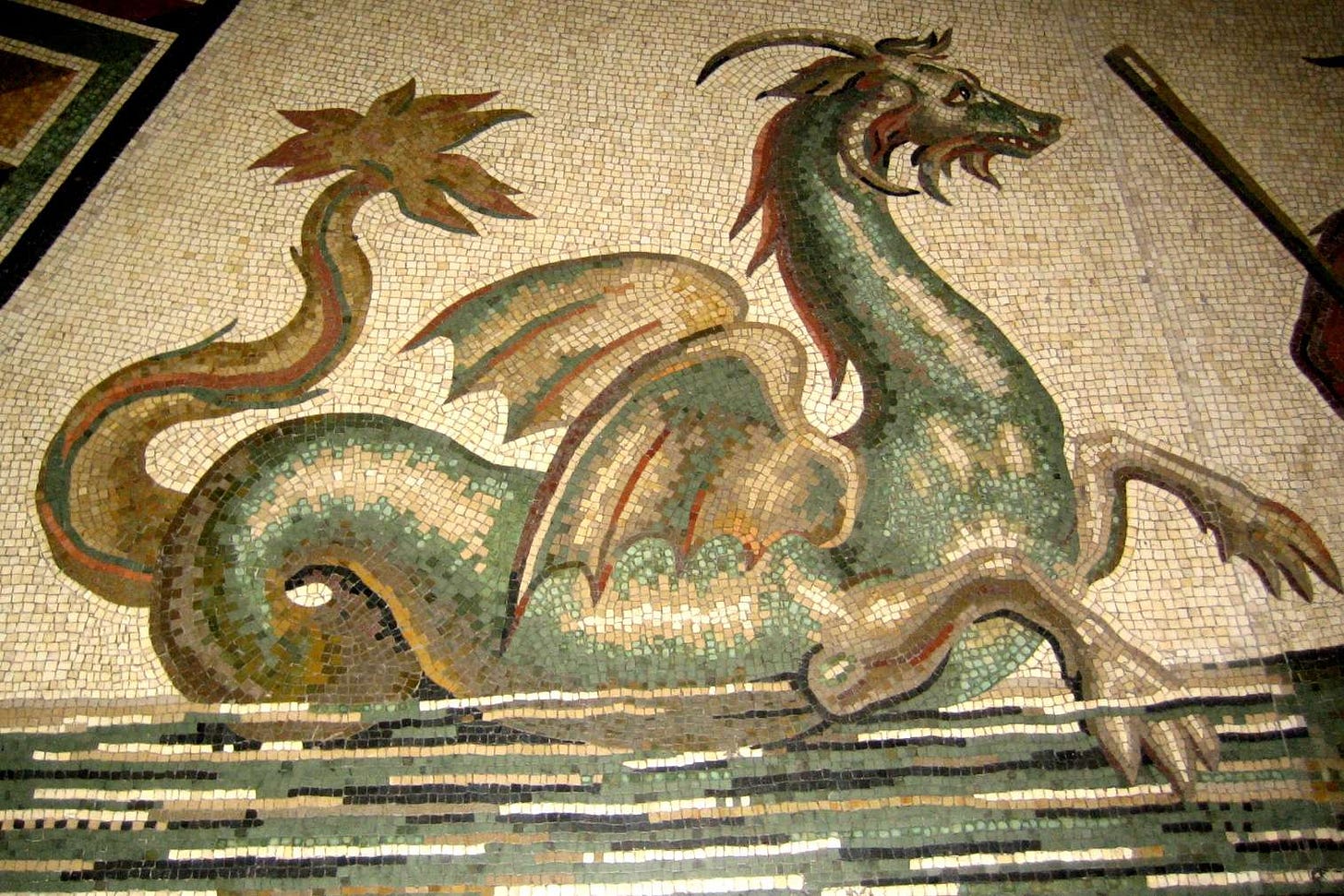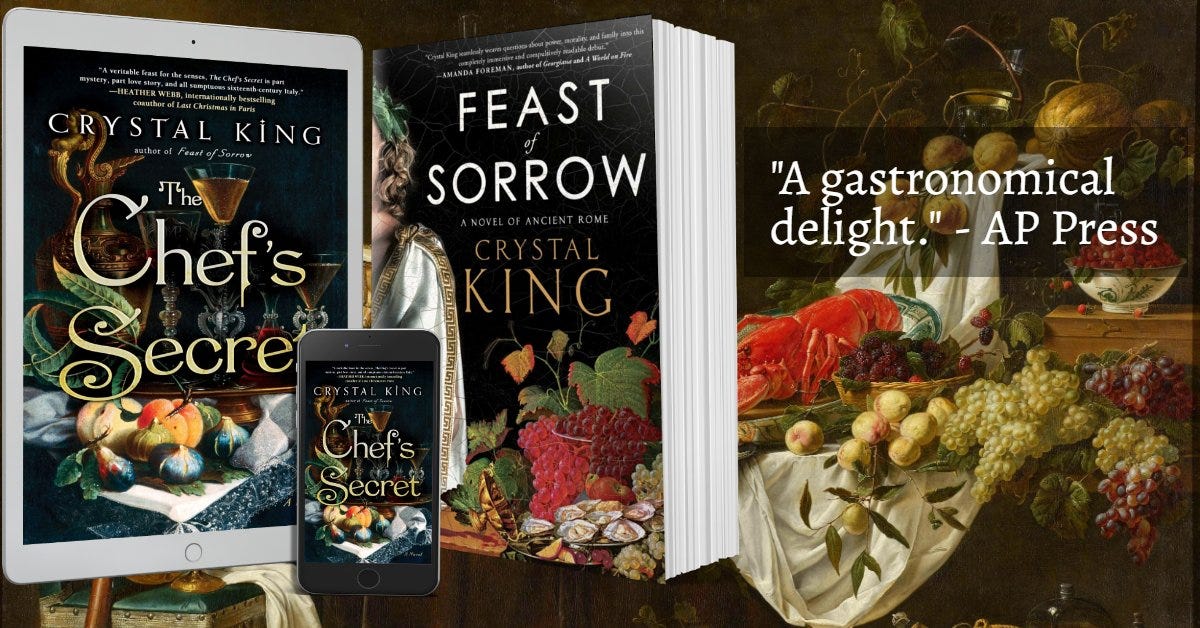I’m often asked about my influences. When it comes to Feast of Sorrow, one is Pliny the Elder, a man who made his mark in 36 books about the ancient world, the Naturalis Historia, the first "encyclopedia.”
Pliny the Elder was a Roman author, naturalist, and philosopher born in AD 23 in northern Italy. He was educated in Rome and served as a naval officer in the Roman Empire. He was also a prolific author, producing numerous works on various topics, including history, philosophy, and natural history. He died during the eruption of Mount Vesuvius in AD 79 while attempting to rescue a friend.

Pliny’s most significant contribution to the world of literature is his Naturalis Historia, which is a massive compilation of knowledge on a wide range of subjects, including zoology, botany, mineralogy, and more. The encyclopedia contains information on thousands of species of animals, plants, and minerals, and it has had a lasting influence on the development of natural history and science.
Toward the end of my novel, I feature him as a child attending one of Apicius’ feasts with his parents, complete with a tablet and stylus, ready to record everything he sees. In fact, his very astute observation of Apicius’ wealth greatly influences the story.
I took the idea for this scene from one of Pliny's mentions about Apicius in his encyclopedia, about how he died. Apicius appears in a few other places within the work, including this entry on how to pickle a mullet in its own juices—alive.
The masters in gastronomy inform us, that the mullet, while dying, assumes a variety of colours and a succession of shades, and that the hue of the red scales, growing paler and paler, gradually changes, more especially if it is looked at enclosed in glass. M. Apicius, a man who displayed a remarkable degree of ingenuity in everything relating to luxury, was of opinion, that it was a most excellent plan to let the mullet die in the pickle known as garum and he proposed a prize for anyone who should invent a new sauce, made from the liver of this fish.I find it much easier to relate this fact, than to state who it was that gained the prize.
Pliny dedicated his encyclopedia to his friend and employer, Emperor Vespasian. In his lengthy dedication, he tells the ruler:
I have included in thirty-six books 20,000 topics, all worthy of attention, (for, as Domitius Piso says, we ought to make not merely books, but valuable collections,) gained by the perusal of about 2000 volumes, of which a few only are in the hands of the studious, on account of the obscurity of the subjects, procured by the careful perusal of 100 select authors; and to these I have made considerable additions of things, which were either not known to my predecessors, or which have been lately discovered. Nor can I doubt but that there still remain many things which I have omitted; for I am a mere mortal, and one that has many occupations. I have, therefore, been obliged to compose this work at interrupted intervals, indeed during the night, so that you will find that I have not been idle even during this period. The day I devote to you, exactly portioning out my sleep to the necessity of my health, and contenting myself with this reward, that while we are musing on these subjects (according to the remark of Varro), we are adding to the length of our lives; for life properly consists in being awake.
And awake Pliny was! Even in the middle of the night, he tells us. His books are an incredible curiosity, full of his observations and conversations about all manner of topics, some of which are so fascinating that I feel compelled to share them with you here.
On Coming Back to Life
I’m guessing this is where Washington Irving got the idea for Rip VanWinkle.
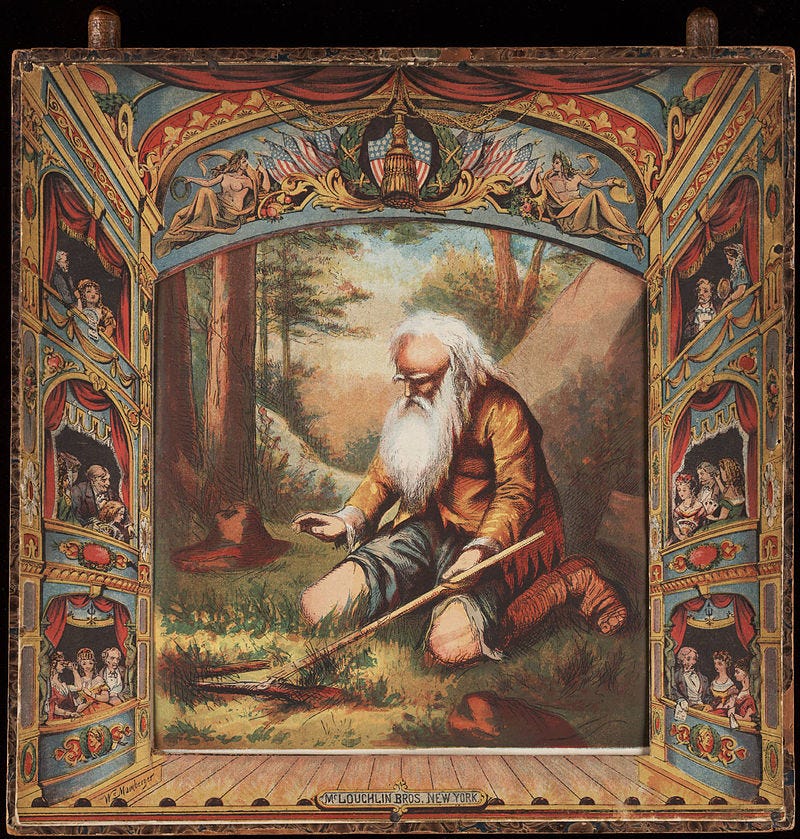
It is told of Epimenides of Cnossus, that when he was a boy, being fatigued by heat and walking, he fell asleep in a cave, where he slept for fifty-seven years; and that when he awoke, as though it had been on the following day, he was much astonished at the changes which he saw in the appearance of every thing around him: after this, old age, it is said, came upon him in an equal number of days with the years he had slept, but his life was prolonged to his hundred and fifty-seventh year. - CHAP. 53. (52.)—PERSONS WHO HAVE COME TO LIFE AGAIN AFTER BEING LAID OUT FOR BURIAL.
Of the Phœnix.
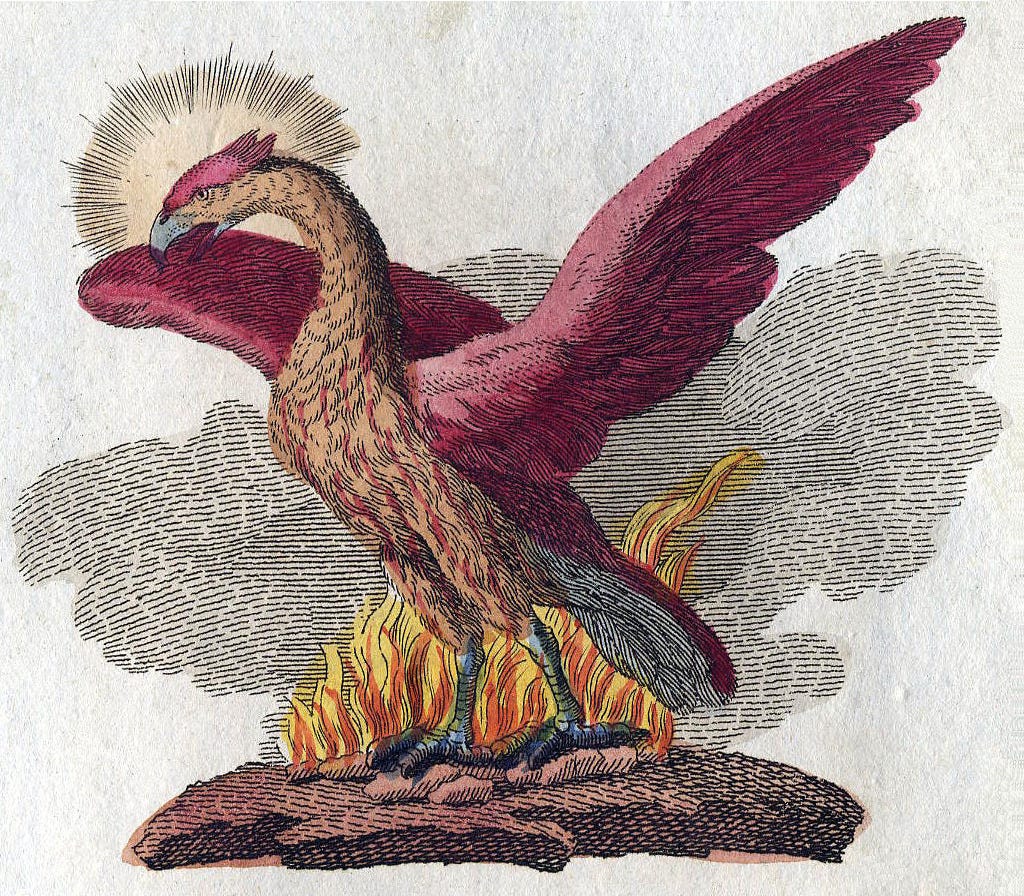
Æthiopia and India, more especially, produce birds of diversified plumage, and such as quite surpass all description. In the front rank of these is the phœnix,that famous bird of Arabia; though I am not quite sure that its existence is not all a fable. It is said that there is only one in existence in the whole world, and that that one has not been seen very often. We are told that this bird is of the size of an eagle, and has a brilliant golden plumage around the neck, while the rest of the body is of a purple colour; except the tail, which is azure, with long feathers intermingled of a roseate hue; the throat is adorned with a crest, and the head with a tuft of feathers. The first Roman who described this bird, and who has done so with the greatest exactness, was the senator Manilius, so famous for his learning; which he owed, too, to the instructions of no teacher. He tells us that no person has ever seen this bird eat, that in Arabia it is looked upon as sacred to the sun, that it lives five hundred and forty years, that when it becomes old it builds a nest of cassia and sprigs of incense, which it fills with perfumes, and then lays its body down upon them to die; that from its bones and marrow there springs at first a sort of small worm, which in time changes into a little bird: that the first thing that it does is to perform the obsequies of its predecessor, and to carry the nest entire to the city of the Sun near Panchaia, and there deposit it upon the altar of that divinity. CHAP. 2. (2.)—THE PHŒNIX.
On Cinnamon
Definitely not Phoenix droppings. And 👀on the country of origin.

Fabulous antiquity, and Herodotus more particularly, have related that cinnamomum and cassia are found in the nests of certain birds, and principally that of the phœnix, in the districts where Father Liber was brought up; and that these substances either fall from the inaccessible rocks and trees in which the nests are built, in consequence of the weight of the pieces of flesh which the birds carry up, or else are brought down by the aid of arrows loaded with lead. It is said, also, that cassia grows around certain marshes, but is protected by a frightful kind of bat armed with claws, and by winged serpents as well. All these tales, however, have been evidently invented for the purpose of enhancing the prices of these commodities. Another story, too, bears them company, to the effect that under the rays of the noon-day sun, the entire peninsula exhales a certain indescribable perfume composed of its numerous odours; that the breezes, as they blow from it, are impregnated with these odours, and, indeed, were the first to announce the vicinity of Arabia to the fleets of Alexander the Great, while still far out at sea. All this, however, is false; for cinnamomum, or cinnamum, which is the same thing, grows in the country of the Æthiopians,who are united by intermarriages with the Troglodytæ. CHAP. 42. (19.)—CINNAMOMUM.1 XYLOCINNAMUM.
Being Saved by Dragons
If only you had a dragon to come to your aid!
Facts such as these induce us to give some credit to what Democritus relates, who says that a man, called Thoas, was preserved in Arcadia by a dragon. When a boy, he had become much attached to it, and had reared it very tenderly; but his father, being alarmed at the nature and monstrous size of the reptile, had taken and left it in the desert. Thoas being here attacked by some robbers who lay in ambush, he was delivered from them by the dragon, which recognized his voice and came to his assistance. But as to what has been said respecting infants that have been exposed and nourished by the milk of wild beasts, as in the case of the founders of our city by a wolf, I am disposed to attribute such cases as these rather to the greatness of the destinies which have to be fulfilled, than to any peculiarity in the nature of the animals themselves. CHAP. 22. —A MAN RECOGNIZED AND SAVED BY A DRAGON.
These are only a few of the thousands of entries in Pliny’s 36 books. Many entries are far more mundane, and others so fantastical that they can’t be believed. But in between, there are so many wonderful depictions of the ancient world that bring brilliant color to what life in antiquity was like. Pliny's Naturalis Historia is still studied and consulted by scientists and researchers interested in the natural world. His writings on philosophy and history have had a lasting impact on the development of Western thought—and on me!
UPDATE:
Last week I wrote about Penguin’s children’s imprint, Puffin, changing the works of Roald Dahl. Well, after the backlash, they decided that rather than abandoning the project, that they would cash in on two versions.
Additionally, Ian Fleming’s James Bond books are being edited to be less racist. One big difference between this and the Dahl case is that Fleming did change some of his books to omit racism when he was alive, and his estate says these latest edits are changes that Fleming would have wanted.
Divining The Plot of Your Next Book
A few weeks ago, I gave away a copy of Kris Waldherr’s fantastic book about the women of Frankenstein, Unnatural Creatures. What I didn’t mention is that she’s also the creator of one of the best-selling tarot decks in the world, The Goddess Tarot.
Now Kris is offering a super cool Tarot workshop for writers!
Tarot for Writers Saturday, April 29th, 9:30 a.m. – 12:30 p.m. ET Via Zoom.
The tarot may be hot these days for predicting the future, but did you know it can also be used as a tool for writing and creativity? This three-hour workshop is designed to introduce you to the mysteries of the tarot to help you break creative blocks and gain inspiration. No previous tarot experience is required. Handouts included. Participants should come equipped with tools for writing and a tarot deck (preferably a Rider-Waite or Goddess Tarot deck). Learn more/register: https://writersinprogress.com/tarot-for-writers-with-kris-waldherr/
What’s Bringing Me Joy This Week:
This is how you help your cat have human expressions.
This 1993 video of Radiohead playing Creep on Conan O’Brien:
And yes, I have seen the news about the Vinandolo phallus, long thought to have been a pestle of some sort, but historians have changed their mind. If you are into that sort of thing, one of my fave authors of Ancient Roman fiction, LJ Trafford, started up #phallusthursday on Twitter a few years back, and it’s fascinating and often hilarious.
Thanks for joining me this week! If you haven’t read THE CHEF’S SECRET or FEAST OF SORROW, click the links to learn where to buy your copy! 🍒🍗🍷
You can also follow me in these places too:
Website | Instagram | Facebook | Mastodon




